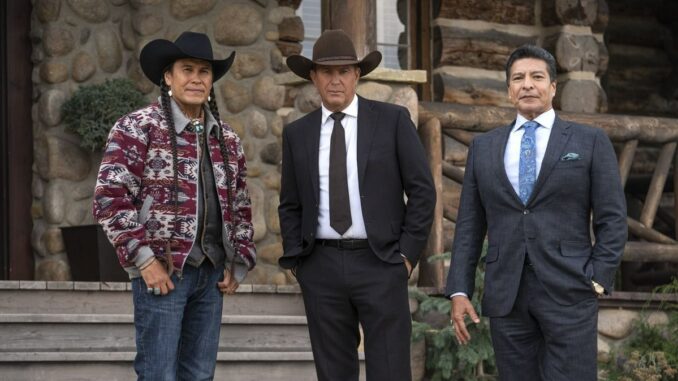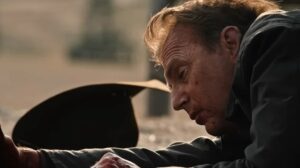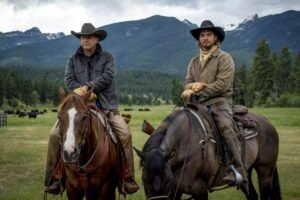
The gripping drama of “Yellowstone” continues to captivate audiences, with its latest episodes revealing intense emotional moments and shocking plot twists. As fans dissect the intricacies of the storyline, the show’s director has shed light on pivotal scenes, particularly focusing on John Dutton’s bloody crime scene and Beth’s heart-wrenching primal wail. These elements not only enhance the show’s dramatic tension but also deepen the viewers’ connection to the characters and their struggles.
At the heart of “Yellowstone” is John Dutton, portrayed by Kevin Costner, a character defined by his fierce loyalty to family and land. The latest season has taken viewers on a tumultuous journey, culminating in a scene laden with violence and consequence. The director’s insight into John’s actions reveals the psychological burden he carries, showcasing how his decisions are often steeped in desperation. The bloody crime scene serves not only as a turning point for the plot but also as a reflection of John’s internal conflict—his role as protector versus the violent world he inhabits.

The complexity of John Dutton’s character is heightened by the moral dilemmas he faces. As the head of the Dutton family, he is constantly balancing the need to safeguard his ranch against external threats while dealing with the consequences of aggressive actions. The director emphasizes that the crime scene is not merely a plot device; it represents the culmination of John’s fears and the lengths he will go to protect his legacy. This raw portrayal of violence raises questions about justice, loyalty, and the cost of power, resonating deeply with viewers who find themselves grappling with similar themes in their own lives.
Beth Dutton, played by Kelly Reilly, has emerged as one of the most compelling characters in the series. Her fierce independence and willingness to confront those who threaten her family make her a force to be reckoned with. The director highlights a particularly poignant moment in the recent episodes: Beth’s primal wail, a visceral expression of grief and rage that captures her emotional turmoil. This scene not only underscores her character’s depth but also serves as a powerful reminder of the emotional stakes involved in the Dutton family’s struggles.
Beth’s wail is a manifestation of her complex relationship with her father and her deep-seated desire to protect her family at all costs. The director explains that this moment was crafted to symbolize the weight of loss and the impact of violence on the Dutton family dynamic. It illustrates how each character reacts differently to tragedy, and Beth’s raw emotion resonates with viewers who have experienced their own forms of loss and grief. This powerful scene exemplifies the show’s ability to intertwine personal struggles with broader themes of loyalty and sacrifice.
Behind the scenes, the director discusses the collaborative effort that goes into creating these emotionally charged moments. From the writing process to the actors’ performances, each element plays a crucial role in bringing the story to life. The director praises the cast’s commitment to their roles, noting how their performances contribute to the authenticity of the characters’ experiences. This dedication allows for moments of genuine vulnerability, making the audience feel deeply connected to the Duttons and their trials.

The themes of power and revenge are also intricately woven into the fabric of “Yellowstone.” John Dutton’s actions, particularly in the aftermath of the crime scene, reflect a world where the lines between right and wrong are blurred. The director notes that the series aims to explore these moral complexities, inviting viewers to consider the implications of their own choices. As John grapples with the consequences of his decisions, the audience is left to ponder the true cost of loyalty and the impact of familial bonds.
Another key aspect of the series that the director highlights is the breathtaking cinematography that complements the storytelling. The sweeping landscapes of Montana serve as a backdrop for the intense drama, grounding the narrative in a sense of place and history. The director emphasizes that the natural beauty of the setting is not just aesthetic; it mirrors the tumultuous emotions of the characters. The stark contrast between the serene landscape and the violent actions of the Duttons adds another layer of complexity to the narrative.
As the season progresses, the director hints at further revelations and challenges for the characters. Tensions will rise, and the stakes will become even higher, forcing the Duttons to confront their past and their choices. The exploration of themes such as redemption, forgiveness, and the consequences of vengeance will continue to drive the narrative forward.
The director’s insights into John Dutton’s bloody crime scene and Beth’s primal wail reveal the emotional depth that “Yellowstone” offers. These moments are not just for shock value; they are integral to understanding the characters and their motivations. The series has a unique ability to blend intense drama with thought-provoking themes, making it much more than a typical crime drama. As audiences reflect on the moral dilemmas faced by the Dutton family, they are invited to engage with the story on a deeper level.
In conclusion, “Yellowstone” remains a powerful exploration of family, loyalty, and the consequences of violence. The director’s ability to capture the emotional and psychological complexity of the characters enhances the overall viewing experience. As John Dutton faces the fallout from his actions and Beth grapples with her own pain, viewers are left eagerly anticipating what lies ahead for the Dutton family. The series continues to push boundaries, inviting audiences to reflect on their own values and experiences as they become immersed in the world of “Yellowstone.”
